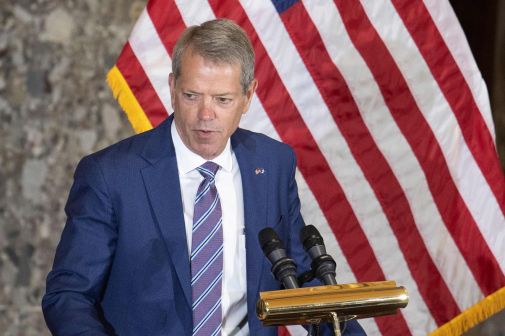Texas creates ‘hostile foreign adversaries unit’ to stop Chinese influence campaigns

Monday marked the first day of a new law active in Texas designed to root out foreign influence campaigns — to stop, in other words, Chinese spies and secret police from harassing and threatening dissidents, or otherwise advancing the agenda of the Chinese Communist Party inside what is arguably the most American state in the United States of America.
The law, SB 2514, establishes a “hostile foreign adversaries unit” in the state’s Department of Public Safety, lending new resources to an ongoing campaign by Texas to rid itself of covert Chinese influence. It creates new criminal penalties for state employees who fail to report foreign influence activity, and it directs the creation of a cybersecurity training program to ensure that government employees can identify efforts by “hostile foreign actors” to influence policy so that it aligns with the agendas of their home countries.
The law joins more than a dozen other new laws and executive orders created over the past year targeting Chinese influence in Texas. The measures have ranged from Gov. Greg Abbott last January prohibiting Chinese apps like DeepSeek from being installed on government-issued devices, to a law banning people with ties to China, Iran, North Korea or Russia from acquiring most types of real estate.
In legislative hearings leading up to the new law’s enactment, the bill’s author, state Sen. Bryan Hughes, made at least three things clear. The first was that he supports the notion of the U.S. as “a melting pot, a nation of immigrants.” He continued: “Many people come here fleeing oppression and fleeing tyranny. And that’s America.” The second point was that his legislation was in principle designed to create additional barriers for agents of all hostile nations seeking to exert influence inside Texas’ borders. The third point he made, though, was that there is one country that occupies the lion’s share of his concern. (Iran was sometimes mentioned in passing, and Russia seldom came up.)
To demonstrate the size of the issue when introducing his bill last April, Hughes pointed to a 2022 memo published by the Office of the Director of National Intelligence citing mounting efforts from Beijing to exploit relationships in even the lowest levels of the United States government. It raised the alarm on China’s ongoing practice of nudging U.S. political leaders toward positions hospitable to its goals, such as those related to Taiwan, Tibetans, Uyghurs and the pro-democracy activists that China frequently targets around the globe.
Analysts specializing in Chinese influence say such campaigns aren’t flukes or fads. An investigation published by The New York Times last week found more than 50 organizations in New York City with ties to the Chinese Communist Party, often nonprofit charities or community heritage clubs. The Times investigation found numerous instances of the groups targeting state and local politicians who had, for instance, been friendly with Taiwan or had supported Hong Kong democracy. In some cases, they’ve succeeded in supplanting officials with their own China-friendly picks.
FBI counterintelligence agents in 2022 searched a building in New York’s Chinatown, one of reportedly more than 100 secret police stations around the globe operated by Chinese agents who collect intelligence and solve crimes independently of legitimate law enforcement, often to target the Chinese diaspora. Similar secret police stations have been reported in many other countries, including Britain, Canada, France, Germany, Hungary, Ireland, Italy, Japan and the Netherlands. And they could certainly be operating in the American South, a notion that repels lawmakers like Arizona state Rep. Matt Gress, a Republican whose own anti-foreign influence legislation died in committee last year.
“Foreign powers are squeezing and silencing those they oppose and dislike by running illegal police stations, harassing, stalking, spying and sometimes even physically assaulting American citizens and residents. This is absolutely unacceptable,” Gress said during a hearing early last year.
There are instances of China attempting to covertly influence even the highest office in the United States, but it places many more of its bets on lower-stakes games. Jacqueline Deal, a senior fellow at the Philadelphia think tank Foreign Policy Research Institute, said the CCP sometimes refers to its strategy as “using the local to surround the center,” an integral piece of the party’s “united front” political strategy, which uses organizations dotted around the globe — at least 600 in the United States, by Newsweek’s count in 2020 — to hide itself as the orchestrator of its many influence campaigns.
Deal, who has studied China and its military for decades, said that China’s united front work, which the CCP calls its “first magic weapon,” can sound like crazy talk to the uninitiated, but that many living in the United States are unfortunately all too familiar with the strategy. Rowena He, a historian who wrote a book called Tiananmen Exiles, told Texas lawmakers during testimony last March of the pressure she received from those working on behalf of the CCP: “They called me a prostitute for the United States. They threatened to rape me.”
An investigation last year by The Washington Post found that non-state actors recruited by China frequently assist in intimidation campaigns in broad daylight, convening to squelch protests or dissent against the CCP or Xi Jinping, the party’s general secretary. The Post reported that pro-CCP activists often acted aggressively, attacking protestors with their fists and feet, flagpoles and chemical sprays, and sometimes threw handfuls of sand in protestors’ faces.
All of this means that Chinese Americans and visiting scholars, well aware of the nation’s long reach, are discouraged from exercising their First Amendment right to criticize China’s poor human rights record.
“They don’t speak out about certain topics, they don’t take certain courses, they don’t go to certain events because they feel like the Chinese Communist Party is in the United States watching them and they will punish them if they talk about certain things,” Deal said during testimony for SB 2514.
Texas’ raft of new laws isn’t only an allergic reaction to Chinese influence in the U.S., but also an explicit response to a call from the Trump administration for lower levels of government to “play a more active and significant role in national resilience and preparedness.” In an executive order published last March, titled “Achieving Efficiency Through State and Local Preparedness,” Donald Trump called on “State, local, and even individual levels” to do more to address risks including “cyber attacks, wildfires, hurricanes, and space weather.”
The executive order sketches out a future in which the federal government continues to play a leadership role on preparedness, but the precise details of how the various levels of government would divide up the work are left to be spelled out in a series of upcoming plans and frameworks ordered up by the document. These include a national resilience strategy, a national continuity policy, a national risk register, federal national functions constructs and a new process for evaluating misinformation efforts.
When asked by StateScoop about the status of each of these various plans, a White House official replied that the administration “continues to make progress towards a transformational approach to national resilience, ensuring the appropriate role for the Federal Government while looking to empower states and local governments to make smart choices.” The statement continued: “These approaches are already starting to be seen in response and recovery efforts. Given the breadth of the concept of resilience, we are working to optimize alignment with other key policy doctrine to maximize the successful implementation of the National Resilience Strategy.”
The dubious capacity of individuals to do something about space weather aside, some experts are skeptical about the prospect of states doing more of the work that’s long been done by a federal government with deep expertise across a variety of arcane subjects. Tony Sager, who studied mathematics and computer science before spending three decades in the National Security Agency, said it’s not realistic to expect state governments to do international counterintelligence work without strong federal support.
“The machinery of spying, at the nation-state level, the insight into what other nations are doing to us and what we’re doing to them, is a very expensive, specialized body of knowledge and infrastructure it takes to do that,” Sager said. “The notion that you could do that at the state level doesn’t make any sense at all.”
But SB 2514, said Deal, the China researcher, was designed with national partnership in mind. In an email, she wrote: “It’s not either-or with regard to the federal and state levels. It’s all hands on deck. The idea is that we need to share information from community to community, between states, and to and from the federal level.”
CCP experts like Deal often lament the dearth of capacity at the FBI to offer support in cases of harassment and threats. She pointed out that the nation’s 700,000-plus police officers could solve a scaling problem that the FBI’s 14,000 field agents cannot. “Of course they are the first line of defense and should be maximally aware of threats to the people they are protecting,” she said of local law enforcement.
Kelley Currie, a senior fellow at the international affairs think tank Atlantic Council, testified before Texas senators last April that SB 2514, with its mandate for providing new training to state and local law enforcement, could make Texas a leader among states in combating transnational repression. She recalled decades of observing China using a host of techniques to exploit people, “willing and unwilling assets in other countries to do their bidding.”
“The Chinese Communist Party honed its cyberattack strategies against [nongovernmental organization] and against groups like the Tibetans, the Uyghurs and the Taiwanese by targeting these groups, these NGOs and these individuals that they wanted to get information about,” Currie said. “We were the first targets of what has now become the most sophisticated cyber operation in the world.”
She went on to explain that local law enforcement is the first line of defense when a Chinese dissident in Texas is being harassed, and if they don’t understand the mechanics of that harassment, “they’re going to treat it as a garden variety crime and not understand what is driving that and therefore misapply resources or not apply resources at all.”
If Texas gets the federal support it needs to repel China’s united front campaign and go toe-to-toe with “the most sophisticated cyber operation in the world,” it will be a deviation from the Trump administration’s recent reductions in support for other state programs. Homeland Security Secretary Kristi Noem has dialed back resources for states on cybersecurity, election security and natural disaster response through the Federal Emergency Management Agency. “We want to wean off of FEMA, and we want to bring it down to the state level,” Trump told reporters at an Oval Office briefing last June, after supposing earlier in the year that he might eliminate the agency altogether.
More to the point, in his second term, Trump has chipped away at the national apparatus for investigating and stopping foreign influence campaigns. Many federal workers who were safeguarding election systems from cyberattacks have been reassigned or fired. Officials at the FBI and the Cybersecurity and Infrastructure Security Agency who’d been tasked with investigating disinformation have been reassigned as Noem has sought to get CISA “back on mission”: defending the nation’s critical infrastructure only. (This has been despite many IT security analysts arguing that fighting disinformation, and winning hearts and minds, is an inextricable part of cybersecurity work.)
Last month, Tulsi Gabbard, the director of national intelligence, announced a reorganization of her office that included eliminating the National Intelligence University, which trains midcareer intelligence professionals out of its campus in Bethesda, Maryland, and shrinking the Foreign Malign Influence Center, as she seeks to jettison the “deep state” employees hired by previous administrations whom she claims are attempting to sabotage Donald Trump.
The Foreign Malign Influence Center is, according to its website, the “primary” way that the federal government integrates intelligence related to foreign influence and threats to democracy. The center focuses on “subversive, undeclared, coercive, or criminal activities by foreign governments, non-state actors, or their proxies to affect another nation’s popular or political attitudes, perceptions, or behaviors.” In the abstract, the national center does the same thing that Texas’ new division aims to do. Except that its targets may vary: the center has held briefings warning of Russia’s attempts to manipulate the last election and of its deepfake-fueled disinformation campaigns, which spread false information about damaged ballots and illegal voting.
Justin Miller, a University of Tulsa associate professor who previously led electronic crimes task forces and breach investigations for the Secret Service, said Texas will need to rely heavily on partnerships with federal agencies that have expertise in the relevant cybercrime, drug and human trafficking investigations — along with social media companies and information sharing and analysis centers. (Though ISACs, too, are seeing their funding cut by the federal government.)
“That level of intelligence I’m thinking has to come from the federal government, and we’ve decimated all of our national security, our civil service personnel with experience and operational know-how at the federal level,” Miller said. “I’m not seeing the states having the reach and international sway for that to be effective.”
But Miller said that he can also imagine a best-case scenario in which Texas’ new hostile foreign adversaries unit becomes effective, enhancing information-sharing and more quickly spotting influence operations through a diverse network of public and private partners — that’s if it can manage not to be redundant with federal efforts, however diminished they may be in Trump’s America. Though Miller said he also worried about the possibility of a governor weaponizing the unit by labeling detractors or political opponents as being aligned with hostile foreign adversaries — “Cyber, social media, it’s an influence space. Even if a designation is later reversed, the reputational damage is lasting.”
Such politicized uses of foreign influence laws have precedent. The Foreign Agents Registration Act, a 1938 law that was created to counter Nazi propaganda during the Second World War, was criticized in later years for being selectively applied, based on a given administration’s politics. Miller supposed that SB 2514, and Texas’ other anti-influence legislation, might also be a case of Texas looking for new ways to echo Trump’s economic war with China — and his aversion to any discussion of Russian influence.
Hughes, the bill’s author, who declined to be interviewed for this article, trails a legislative record that includes all the bugbears of today’s Republican party. The Texas Tribune recently ranked him as the state’s most conservative senator, a lawmaker who’s introduced legislation opposing abortion, voting by mail and critical race theory from being taught in public schools. He’s also passed bills prohibiting social media companies from banning, demonetizing or discriminating against users based on their politics. Anyone paying attention might have predicted he would introduce SB 2514.
“It’s a simple idea,” Hughes told his state’s Senate when wrapping up his introduction of the bill. “Texas can not be the weak link in the chain of American national security.”
Corrected Sept. 3, 2025: This story originally stated that SB 2514 created new criminal penalties for those carrying out foreign influence campaigns. In fact, it creates penalties for state employees who fail to report them.






